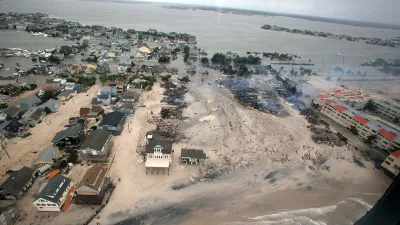In a worst case scenario, generated by a new study published in the Proceedings of the National Academy of Sciences of the United States of America, land home to 25 million Americans will be lost to rising seas as a result of climate change.

Chris Mooney shares news of a study that details the land on the coast of the United States that will be inundated by sea water as the effects of climate change become more and more cemented into the environment. "Future emissions will determine which areas we can continue to occupy or may have to abandon," according to the report.
Many U.S. cities are "committed to futures below sea level," if climate change continues unchecked. The critical number that drives the study's estimates: "For every one degree Celsius of warming, the scientists estimate that we should expect 2.3 meters of long-term, eventual sea-level rise, playing out over millennia."
Benjamin Strauss of Climate Central in Princeton, N.J. led the study, with co-authors Scott Kulp of Climate Central and Anders Levermann of the Potsdam Institute for Climate Impact Research in Germany.
So according to the study's calculations, if the world were to continue with business as usual and suffer the consequences of the sea level rise that would follow, "the current locations of over 26 million Americans’ homes might be inundated, and more than 1,500 U.S. cities and municipalities could find the areas where half of the residents live inundated." For those doing the quick math at home, that's more people than live in each of 48 states in the United States—all but California and Texas.
Climate Central has an interactive map that shows how the country's geography would change in various scenarios of increased temperatures and corresponding sea levels.
A similar study, released last year, targeted Anchorage, Seattle, and Detroit as prime real estate after the seas come for the country's current coastal communities.
FULL STORY: This is how rising seas will reshape the face of the United States

Analysis: Cybertruck Fatality Rate Far Exceeds That of Ford Pinto
The Tesla Cybertruck was recalled seven times last year.

National Parks Layoffs Will Cause Communities to Lose Billions
Thousands of essential park workers were laid off this week, just before the busy spring break season.

Retro-silient?: America’s First “Eco-burb,” The Woodlands Turns 50
A master-planned community north of Houston offers lessons on green infrastructure and resilient design, but falls short of its founder’s lofty affordability and walkability goals.

Test News Post 1
This is a summary

Analysis: Cybertruck Fatality Rate Far Exceeds That of Ford Pinto
The Tesla Cybertruck was recalled seven times last year.

Test News Headline 46
Test for the image on the front page.
Urban Design for Planners 1: Software Tools
This six-course series explores essential urban design concepts using open source software and equips planners with the tools they need to participate fully in the urban design process.
Planning for Universal Design
Learn the tools for implementing Universal Design in planning regulations.
EMC Planning Group, Inc.
Planetizen
Planetizen
Mpact (formerly Rail~Volution)
Great Falls Development Authority, Inc.
HUDs Office of Policy Development and Research
NYU Wagner Graduate School of Public Service




























